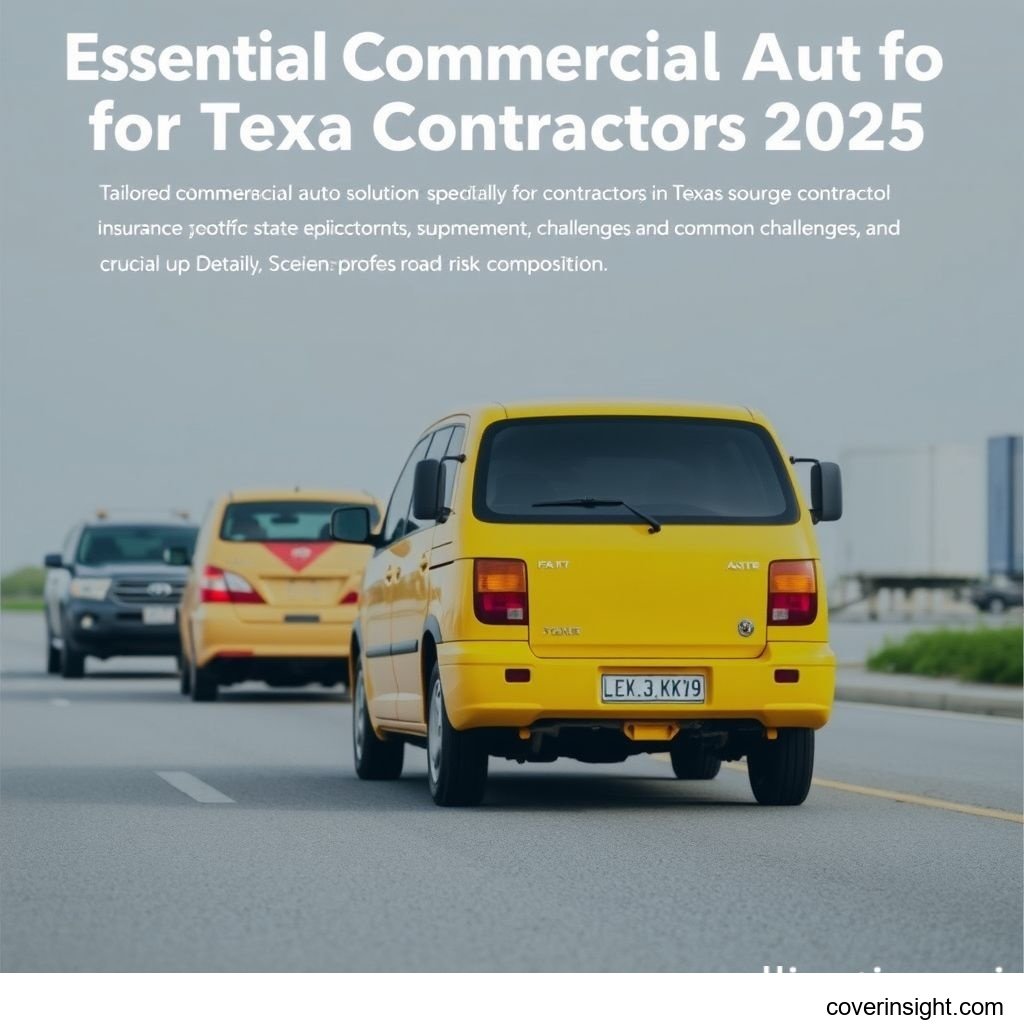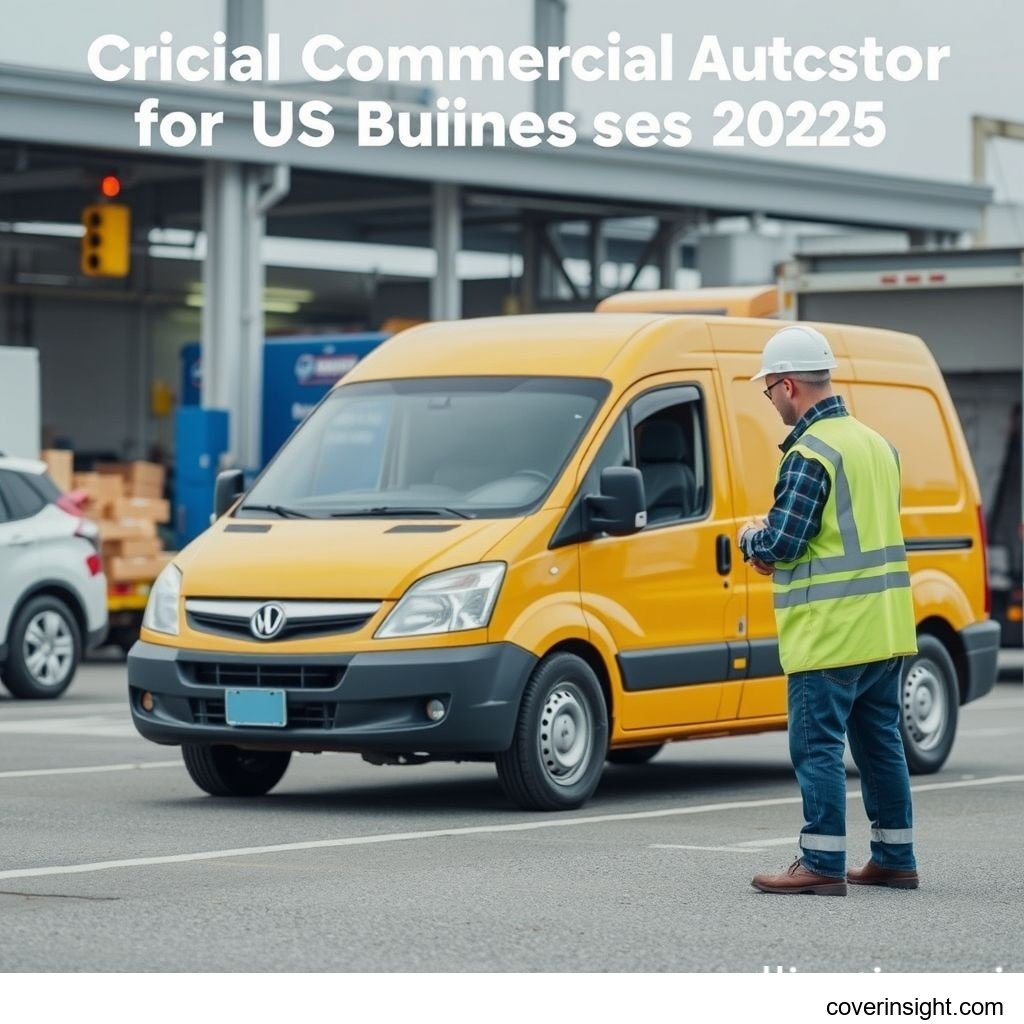Essential Commercial Auto for Texas Contractors 2025
Introduction
In the dynamic landscape of the United States economy, particularly for Texas contractors, robust commercial auto insurance is not merely a legal obligation but a cornerstone of business resilience. As we move into 2025, the complexities of operating a fleet, from a single pickup truck to multiple heavy-duty vehicles, demand comprehensive protection. For any Texas contractor, understanding the nuances of commercial auto insurance can mean the difference between a minor setback and catastrophic financial loss, safeguarding assets, employees, and reputation in an ever-evolving regulatory and risk environment. It's about ensuring your wheels keep turning, come what may.
Coverage Details
Navigating the world of commercial auto insurance can feel like untangling a complex knot, but understanding what's typically included and what's often left out is key to making informed decisions.
What’s Included
A solid commercial auto policy for Texas contractors typically bundles several critical coverages designed to protect your business from various vehicular risks:
-
Liability Coverage: This is the bedrock, covering bodily injury and property damage you cause to others in an accident. Texas law mandates minimum liability limits, but most savvy contractors opt for higher coverage to truly protect their assets.
-
Collision Coverage: Pays for damages to your own insured vehicle if it collides with another object or overturns, regardless of who is at fault. Essential for protecting your significant investment in work vehicles.
-
Comprehensive Coverage: Protects your vehicles from non-collision incidents such as theft, vandalism, fire, flood, falling objects, or damage from striking an animal. Think of it as your vehicle's all-weather shield.
-
Uninsured/Underinsured Motorist (UM/UIM) Coverage: Crucial in Texas, this protects you if you or your employees are involved in an accident with a driver who has no insurance or insufficient insurance to cover the damages.
-
Medical Payments (MedPay) or Personal Injury Protection (PIP): Covers medical expenses for you and your passengers, regardless of fault, up to a specified limit.
-
Hired and Non-Owned Auto Liability: This often-overlooked coverage protects your business when employees use their personal vehicles for company business (non-owned) or when you rent vehicles (hired). Given the diverse operations of many contractors, this is incredibly valuable.
For a broader understanding of how these coverages fit into a larger business insurance strategy, exploring resources like "Smart Commercial Auto Insurance for US Businesses 2025" can provide valuable context.
Common Exclusions
While comprehensive, commercial auto policies do have their limits. Common exclusions often include:
-
Intentional Acts: Damage or injury caused intentionally by the insured party.
-
Wear and Tear: Routine maintenance, mechanical breakdowns, or depreciation are not covered.
-
Personal Use: If a vehicle designated for commercial use is involved in an accident while being used purely for personal reasons, coverage might be denied.
-
Racing or Off-Roading: Use of vehicles for competitive driving or in unapproved off-road environments typically voids coverage.
-
Concealed Damages: Pre-existing damage or issues not disclosed at the time of policy inception.
-
Hazardous Materials: Specific exclusions may apply if your vehicles are transporting certain hazardous materials without proper endorsements or separate specialized policies.
Understanding these exclusions is vital to avoid nasty surprises down the road. It’s always best to discuss your specific operations with your insurer.
Cost Analysis
The cost of commercial auto insurance for Texas contractors isn't one-size-fits-all. Several factors conspire to determine your annual premiums.
Price Factors
When an insurer calculates your premium, they're looking at your unique risk profile. Here’s what typically influences the price tag:
-
Type of Vehicles: Larger, heavier, and more expensive vehicles (e.g., dump trucks, excavators, specialized equipment haulers) naturally incur higher premiums due to greater potential for damage and liability.
-
Driving Records: The driving history of all drivers associated with your business is paramount. A history of accidents, traffic violations, or DUIs will significantly increase rates.
-
Industry and Usage: Contractors face unique risks. Hauling heavy equipment, driving on construction sites, or long-haul routes generally mean higher premiums than, say, a delivery service with smaller vehicles.
-
Coverage Limits and Deductibles: Higher liability limits mean more protection, but also a higher premium. Conversely, choosing a higher deductible (the amount you pay out-of-pocket before insurance kicks in) can lower your premium.
-
Location of Operation: Texas, with its vast network of highways and busy urban centers, has varying risk levels. Areas with higher accident rates or theft statistics might see higher premiums. For example, recent data from the Texas Department of Transportation (TxDOT) indicates that commercial motor vehicles were involved in a significant percentage of fatal crashes across the state in recent years, highlighting the inherent risks.
-
Claims History: Businesses with a history of frequent or costly claims will generally pay more, as they represent a higher future risk to the insurer.
Saving Tips
While you can't control every factor, there are smart strategies Texas contractors can employ to keep their commercial auto insurance costs in check:
-
Prioritize Driver Safety: Implement robust safety programs, conduct regular driver training, and maintain strict hiring standards. Fewer accidents mean lower premiums in the long run. Many insurers offer discounts for businesses with strong safety records.
-
Bundle Policies: Many insurers offer discounts when you bundle multiple policies, such as commercial auto, general liability, or worker's compensation. This can streamline your insurance management too.
-
Increase Deductibles: If your business has a healthy emergency fund, opting for a higher deductible on collision and comprehensive coverage can noticeably reduce your premiums. Just be sure you can comfortably cover that deductible should a claim arise.
-
Maintain a Clean Driving Record: Encourage all employees to drive responsibly. Even minor infractions can add up on your insurance bill.
-
Regular Vehicle Maintenance: Well-maintained vehicles are safer and less prone to breakdowns, which can reduce the likelihood of incidents and keep claims down.
-
Shop Around Annually: Don't just renew automatically. The insurance market is competitive. Get quotes from multiple providers each year to ensure you’re getting the best rates for the coverage you need. When looking for general guidance, it helps to consult "Insurance Resources Global" to understand market trends.
-
Leverage Telematics: Some insurers offer discounts for installing telematics devices in your vehicles, which monitor driving behavior. Safe driving can be rewarded with lower rates.
FAQs
How much does commercial auto insurance cost?
The cost varies significantly based on factors like vehicle type, number of vehicles, driver records, industry, and coverage limits. It could range from a few hundred dollars a month for a single vehicle to several thousands for a large fleet.
What affects premiums?
Key factors include the type and number of vehicles, the driving history of your employees, your business's claims history, the level of coverage chosen, your operating location in Texas, and your industry’s specific risks.
Is it mandatory?
Yes, commercial auto insurance is mandatory in Texas for any vehicle used for business purposes, just like personal auto insurance. Texas law requires minimum liability coverage. Operating without it can lead to severe penalties, including fines and vehicle impoundment. For more specifics on state regulations, you might refer to your "State Insurance Departments" or the Texas Department of Insurance.
How to choose?
Assess your specific business needs, consider your budget, compare quotes from multiple reputable insurers, and scrutinize policy details for inclusions and exclusions. Prioritize adequate liability limits, especially as a contractor. Consulting with an experienced insurance broker specializing in commercial policies is highly recommended.
Consequences of no coverage?
Operating without mandatory commercial auto insurance in Texas can lead to significant fines, vehicle impoundment, suspension of your business registration, and potential civil lawsuits that could devastate your business financially if an uninsured accident occurs. For instance, imagine a Texas contractor, let's call him "Mike," who decided to save a few bucks by letting his commercial auto policy lapse. When one of his crew trucks, driven by an employee, was involved in a fender bender that resulted in a serious injury to a third party, Mike's business faced not only the cost of vehicle repairs but also hefty medical bills and legal fees, ultimately leading to bankruptcy. This real-world scenario underscores why cutting corners on essential coverage is a perilous gamble.
Author Insight & Experience
As someone who's spent years observing the vibrant, yet often unpredictable, flow of commerce in Texas, particularly within the construction sector, I can attest to one fundamental truth: risks are everywhere. From unpredictable weather events to the sheer volume of traffic on our highways, contractors in Texas face unique challenges daily. Based on my experience and countless conversations with business owners, scrimping on commercial auto insurance is a false economy. It's not just about compliance; it's about peace of mind. Knowing that your hard-earned assets are protected against the inevitable bumps and scrapes of doing business on the road allows you to focus on what you do best: building Texas. And while we're talking about essential protections, it's also worth noting that businesses must consider all aspects of risk management, from property to personnel. While not directly related to auto, general resources like "Healthcare.gov" can still serve as a reminder that comprehensive care for employees is part of the broader responsibility of a business owner. For more general guidance on understanding and choosing insurance, the "National Association of Insurance Commissioners" is an excellent resource, offering insights into regulatory frameworks and consumer information across the U.S. And for a truly comprehensive look at your overall business risk, don't forget to visit your "US Insurance Home" for broader advice.








Comments